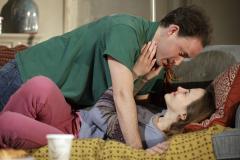
Paulanne Simmons
|
"Belleville" Sometimes Seems Like Bellevue "Belleville"
According to the program production history, Amy Herzog’s "Belleville," commissioned by Yale Repertory Theatre in May 2007, was partly inspired by Herzog’s three-week visit, six months later, to Belleville, a traditionally working class Parisian neighborhood that has more recently become home to an ethnically diverse population, as well as many artists. Although the first draft, called "the Doctor’s Wife," was discarded, as was the next draft and the next draft, the final play, called "Belleville," like all the other versions, centers on an American couple, Abby (Maria Dizzia), a depressed neurotic and her husband, Zack (Greg Keller) a somewhat sadistic often clueless doctor apparently working for Doctors Without Borders. In this incarnation, directed by Anne Kaufman, the other couple is their Senegalese landlords, Alioune (Phillip James Brannon) and his wife Amina (Pascale Armand), stolid, hard-working people who worry about their children and the four months rent Zack owes them. Abby and Zach are very young and pretty hip. Abby practices yoga. Zach smokes lot of weed. They speak the language of sit-coms. But they’re also pretty crazy. Dizzia and Keller have mastered the stereotype. A few minutes into the plays, Abby catches Zack watching porn while masturbating. Over the next few days she gets drunk and throws up several times (thankfully, offstage), stubs her toe and tries to make it better (or perhaps worse) by performing some kind of surgery with a large bread knife (unfortunately, onstage), makes a halfhearted attempt at suicide in the bathtub (blood and nudity), tries to call home several times (her sister is about to give birth) and complains about her lonely and isolated life in Paris.
Zack makes excuses, wipes up the blood, complains about his life (made miserable by his wife), tries to get Abby to take her meds and keeps grabbing the phone out of her hands every time she wants to call home. It’s not clear why. It’s hard to figure out what purpose the landlord and his wife have other than to provide a good example for Zach and Abby. An example, which needless to say, they do not follow. However Armand and Brannon are excellent, entirely believable and sympathetic in their roles. For those who believe a play, any play, that deals with the antics and agony of very disturbed people, "Belleville" is a must-see. But for those who ask for real motivation and a plot that makes sense, "Belleville" poses several problems. It’s hard to point out all the problems in the play without spoiling the drama for those who would like to see it. Let’s just say that much of "Belleville" is confusing and many questions are left unanswered. Why do Zach and Abby stay in Paris when they are so unhappy there? How did Zack expect to survive with no income? How could Zack so easily mislead Abby, a woman who does not seem to be either stupid or naive?
A lot of "Belleville" is built on suspense. We know something awful is going to happen. We’re just not sure when or what. Kaufman milks this suspense with long periods when nothing is happening onstage. After a while suspense turns into boredom. There are a number of scenes that include a lot of French dialogue. This is logical, as the play takes place in Paris. And, of course, the play was inspired by that three-week stay in Belleville. The play, however, is staged in America, where French is not exactly the lingua franca. But even for those who speak French (this reviewer does) not much more is revealed by understanding what the actors are saying. It may be that when Herzog first started writing "Belleville," she had something definite and worthwhile in mind. After all, many great works have been written about neurotic Americans in Paris. But somehow it seems that with "Belleville" she is more a playwright searching for an idea than a playwright trying to make an idea into a play. |
| museums | NYTW mail | recordings | coupons | publications | classified |



